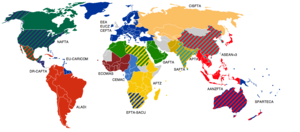- Image via Wikipedia
This weekend I really enjoyed a podcast from a current strategic leadership text on the subject of emerging trends in global strategic leadership. Here are the slides: CurrentTrendsInStrategicManagement
I compared the discussion in slide 2 “new realities in the 21st century” to the military’s formal description of the “Operational Environment” which we use to frame all of our inquiries into requirements for a new warfighting concept, which in turn drives our analysis and assessment of a need for new doctrine, organizations, training, materiel, leadership, personnel, and facilities (which we have artfully named DOTMLPF)
This analytical framework I think is actually “pre-analytical”. It takes the form of an assertion which largely goes unchallenged or, more precisely, unverified. We take it as given with limited real discussion. This is important because it shapes all future discourse, because it creates a framework for understanding the world. When previous iterations of this framing cast the world in terms of digital technology and a belief in the power if information to define and contain the world, we pursued strategies that took these assertions as given, and we launched initiatives that valued technological solutions, and de-valued (therefore under-resourced) things like human intelligence, social networks, and war among the people. Much of our military difficulties of the last 10 years can be traced back to this decision on initial framing.
I say this simply to say that what we take as given becomes increasingly important in the way we choose and then evaluate our strategies. It is normal to decide that deviations from the plan are someone’s fault or a problem with execution, rather than a problem with the initial framing. This is why I find Dr Boje’s use of critical storytelling in narrative inquiry to be so rich with possibilities for understanding and/or appreciating our world.
Back to the comparison of the text to the military Operational Environment (OE). The OE description is the military way of approaching an integration of the elements of national power, which we describe as DIME (diplomacy, information, military, economics). We think of strategy as a way to understand and then integrate these sources of power in support of the national interest, which is essentially and ultimately a political decision.
I found that everything in Slide 2 was contained within the OE. What I find in the OE that’s not reflected in slide 2, includes these important pressures, and conditions:
- The importance and reality of AIDS
- The rising importance of Africa as sn engagement area for regional and global economic powers
- The increasingly growing importance of commodities as economic leverage points
- The growth in number, size, and influence of non-state, and quasi-state actors
- WMDs and terrorism
- Issues associated with immigration, free and partially free-trade
- Human rights as a public relations
- Nations developing their own competitive advantages
- The increasing importance of sovereign wealth funds
- Currencies as weapons and leverage points in increasingly tactical time
- Reduction of slack in interconnected digital financial markets
- The use of political events to achieve economic advantage
- Financialization of the US economy
- Debt bombs in the G20
- Combination positioning of Russia as simultaneously 1st and 3d world country
- National autonomy in an era of Islamic emigration (Sharia law)
- Evolution of mature counties to entitlement societies
- Increasing urbanization of the world
Some recent readings that I found pertinent to this presentation include Nicholas Taleb’s discussion of the Fourth Quadrant (available upon request) which discusses the region where conventional statistical and probabilistic reasoning breakdown and become harmful. I also found Clay Shirky’s discussion of societies that have evolved a degree of complexity that cannot be rolled back to simpler times. Reminds me of the problem of growing a business too fast, to the point where it cannot “un-scale” effectively in a world of increasingly volatile conditions. I have been thinking of this as a need for a strategy of modular scalability
Finally, I like the idea of leadership and visioning as an offer to “subscribe” to a potential future, which can provisionally attract capital, loyalty, customers in waves with degrees of commitment and confidence. Apple seems to be built on this model; we’ll see how important “Antenna-gate” is to their core constituency, and the degree to which Apple is a cult of personality vs a robust business model
Overall I really liked the podcast and think it gets a lot of things right in the speculations about the importance and consequences of the rise of complexity and uncertainty
Related articles by Zemanta
- Social Networks, Technology Converge to Create New ‘Renaissance’ (fastforwardblog.com)
- From Linear to Organic (neilperkin.typepad.com)
- Interview: Rowan Williams (newstatesman.com)
- The New Eugenics (lewrockwell.com)
- Is Another Economics Possible? (economix.blogs.nytimes.com)
- Promise and perils of a small new world: nanotechnology | Health News (health-news-update.info)
- Is Another Economics Possible? (economix.blogs.nytimes.com)
- Andrew C: The Plight of American Manufacturing | The American Prospect (prospect.org)
- The Sovereign Debt Supercycle Will Keep Getting Worse Until Something Breaks (businessinsider.com)
- Reflections on strategic leadership (kansasreflections.wordpress.com)
- Reflecting on a strategic inflection point at CGSC in Army education (kansasreflections.wordpress.com)
- U.S. Enlists Japan As Global Military Partner by Rick Rozoff (dandelionsalad.wordpress.com)
- Organic Strategic Planning – A Wave of the Future (godspace.wordpress.com)
- China Stealth Jet Upstages Gates, Hu (online.wsj.com)
- The CRM Watchlist Part IV: The Social Mainstream (zdnet.com)
- Deepak Chopra On Enlightened Leadership (blogs.forbes.com)
- Gates Moves On, but Not Cloud From China’s Military Test (nytimes.com)
- China Stealth Jet Upstages Gates, Hu (online.wsj.com)
- Gates Moves On, but Not Cloud From China’s Military Test – New York Times (news.google.com)
- Are liberals economic idiots? (seattlepi.com)


